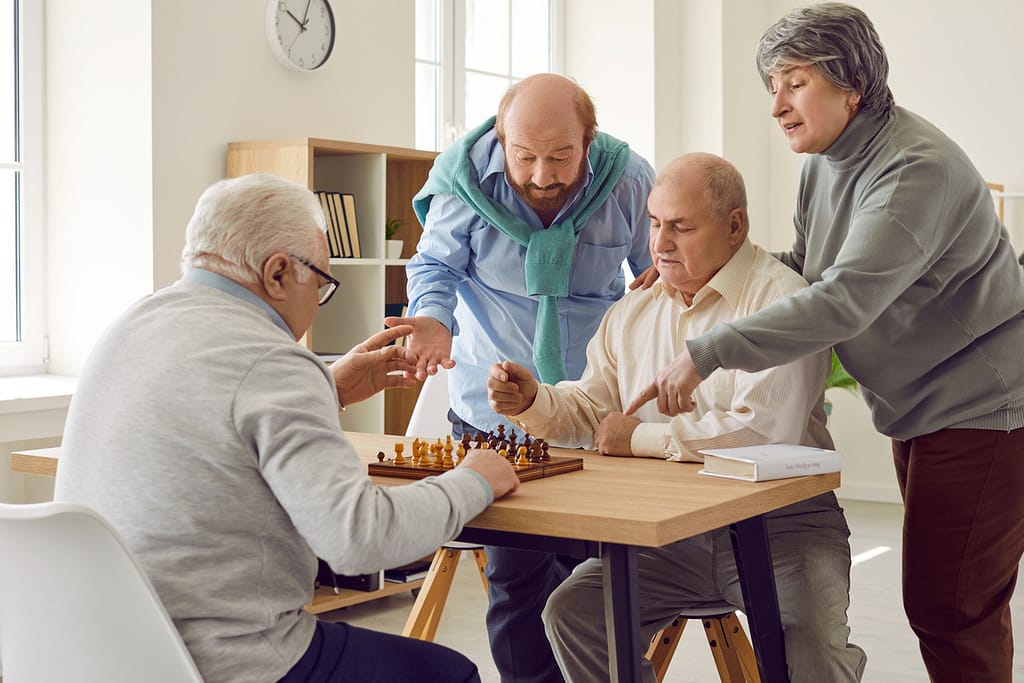Caring for someone with dementia involves more than meeting physical needs—it’s about enhancing their quality of life and maintaining their mental well-being. One powerful way to support this is through brain exercises. These activities can help:
- Stimulate cognitive function
- Slow memory decline
- Provide meaningful engagement
Whether you’re a caregiver or someone living with dementia, brain exercises can become an essential part of daily life. This guide will walk you through effective brain exercises for dementia patients, why they’re beneficial, and how to approach them in a friendly, supportive way.
Why Brain Exercises Matter for Dementia Patients
Before we explore specific brain exercises, it’s essential to understand why these activities are so impactful.
- Stimulate Cognitive Function: Dementia affects memory, problem-solving, and reasoning skills. Brain exercises challenge the brain in these areas, keeping it active and engaged.
- Slow Cognitive Decline: While brain exercises won’t “cure” dementia, they can help slow its progression by prompting the brain to form new connections.
- Improve Emotional Well-Being: Activities that challenge the brain can bring a sense of achievement and satisfaction, improving mood and reducing feelings of isolation.
- Enhance Quality of Life: Structured, engaging activities create meaningful moments that make each day more fulfilling.
Now that we appreciate the benefits, let’s explore activities that truly make a difference.
1. Word and Language Games 📚
Language-focused brain exercises encourage active thinking and memory recall, making them ideal for dementia patients.
a. Word Searches and Puzzles
Word searches stimulate the brain by encouraging pattern recognition and memory. These activities are simple to set up and can be tailored to any skill level.
- Tip: Choose puzzles with larger fonts to make them easier to read.
- Where to Start: Use puzzles themed around topics meaningful to the individual, like favorite hobbies or seasons.
b. Simple Crosswords
Crossword puzzles exercise memory and focus, two areas often impacted by dementia. Offer clues that are easy to follow and use familiar words or phrases.
- Tip: Start with simpler puzzles and provide support when needed to keep frustration low.
c. Reading Aloud
Even if reading comprehension is reduced, the act of reading aloud keeps the brain engaged. It can also be a great bonding activity for caregivers and dementia patients.
- Tip: Opt for short stories or poems with familiar, comforting themes.
2. Visual and Spatial Brain Exercises 👁️
Visual-spatial tasks encourage focus and sharpen problem-solving skills, which are both critical for individuals with dementia.
a. Jigsaw Puzzles
Jigsaw puzzles offer both a mental and tactile experience as patients piece together an image. The activity encourages focus and problem-solving in a soothing, repetitive way.
- Tip: Start with puzzles that have fewer pieces and simple designs, gradually increasing complexity as appropriate.
b. Matching Games
Matching games, like memory cards, nurture short-term memory. You can use cards with images of animals, objects, or even family photos to make the activity more personalized.
- Where to Start: Use large, colorful cards to ensure visibility and make the game user-friendly.
c. Spot-the-Difference Activities
Spot-the-difference games encourage careful observation and visual focus. They offer a fun way to engage while stimulating visual-spatial awareness.
- Tip: Use books or online resources with clear, simple images to avoid overstimulation.
3. Music and Sound-Based Activities 🎵
Music can awaken emotions, spark memories, and even soothe anxiety in dementia patients. Incorporating sound into brain exercises helps stimulate areas of the brain tied to memory and mood.
a. Name That Tune
Play short clips of familiar songs and ask patients to guess the name. Familiar music can trigger memories and associations, fostering a strong emotional response.
- Tip: Use songs the individual loved growing up or from their favorite genre.
b. Sing-Alongs
Singing along to well-known songs helps with memory recall and coordination. Even for individuals with advanced dementia, music often has a positive effect.
- Where to Start: Create a playlist of classics or hits tailored to the individual’s preferences.
c. Rhythmic Exercises
Drumming or tapping rhythms stimulates motor coordination while engaging the brain. Use simple beats and encourage patients to join in.
- Tip: Provide handheld percussion instruments or even household items like spoons or pots.
4. Memory and Recall Challenges 🧠
Memory exercises can help patients maintain cognitive skills and improve their ability to retrieve information.
a. Personal Photo Albums
Browse through family photo albums together and encourage patients to name people or events in the pictures. This fosters memory recall in a familiar and comforting way.
- Tip: Narrate stories and add context to jog their memory gently.
b. Category Games
Ask the patient to name as many items as possible in a specific category (e.g., fruits, animals, or cities). This simple activity encourages quick thinking and recall.
- Where to Start: Choose categories the individual is likely to know well to build confidence.
c. “Story Time” Activities
Create a story together where each person adds a sentence. This is a fun and creative way to work on memory, language, and sequential thinking.
- Tip: Start with a prompt related to current events or shared memories.
5. Physical Activities with a Cognitive Twist 🧘♀️
Physical activity doesn’t just benefit the body—when paired with cognitive elements, it also stimulates the brain. These activities improve blood flow to the brain, supporting overall cognitive health.
a. Chair Yoga with Memory Cues
Combine gentle chair yoga poses with memory prompts. For example, ask about favorite places or events after completing each pose.
- Tip: Keep movements simple and manageable.
b. Exercise Ball Toss
Play catch with a soft exercise ball while asking the individual to answer a question with each toss. For example, “What’s your favorite color?” or “Name a fruit.”
- Where to Start: Use slower, softer throws to make this activity inclusive.
c. Simple Dance Sessions
Put on some music and encourage light dancing. Moving with music not only stimulates the brain but also improves mood and physical coordination.
- Tip: Choose uplifting, familiar songs to encourage participation.
6. Creative and Hands-On Activities 🎨
Creativity unlocks parts of the brain that aren’t always stimulated in routine activities, helping dementia patients express themselves in new ways.
a. Art Therapy
Painting or drawing offers a non-verbal way to communicate and engage. Even simple coloring books can provide a calming, creative outlet.
- Where to Start: Provide large crayons, markers, or paintbrushes for easy handling.
b. Gardening
Planting seeds or tending to small potted plants gives individuals a sense of accomplishment while engaging motor skills. The soothing nature of gardening can also reduce stress.
- Tip: Opt for low-maintenance plants like succulents or herbs.
c. Crafting
From decorating picture frames to making simple bead necklaces, crafting keeps hands and minds busy. It’s also an activity where caregivers and patients can work together.
- Tip: Choose projects with minimal steps and materials to keep things simple.
Tips for Successful Engagement in Brain Exercises
Remember, the goal of these exercises isn’t perfection but engagement and enjoyment. Here are a few tips to ensure success:
- Be Patient: Encourage participation without pressuring. Celebrate small successes.
- Adapt to Their Abilities: Every individual is different. Modify activities as needed for their comfort and skill level.
- Keep Sessions Short: Break activities into manageable chunks to avoid fatigue.
- Make It Fun: Smile, laugh, and enjoy the moment—your positivity is contagious.
- Create a Routine: Introduce brain exercises at the same time each day to establish a comforting routine.
By keeping activities personalized and engaging, you create moments of connection and joy.
Building a Supportive Community
At Sunflower Communities, we know how vital engagement is for dementia patients. By integrating brain exercises into daily routines, caregivers can provide meaningful and stimulating experiences. But you don’t have to do it alone. We are here to support you every step of the way.
If you’d like to learn more or explore personalized care plans, reach out to our team today. Together, we can create a brighter, more fulfilling tomorrow for you and your loved one.




